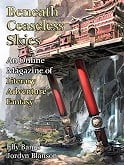 Beneath Ceaseless Skies #280, June 20, 2019
Beneath Ceaseless Skies #280, June 20, 2019
“A Handful of Sky” by Elly Bangs
“Black, Like Earth” by Jordyn Blanson
Reviewed by Tara Grímravn
Over the last year or so, Beneath Ceaseless Skies has become one of my favorite literary fantasy publications. The theme highlighted in each issue, while never explicitly stated, always tends to be incredibly clear in the stories they choose and this time is no different. In this most recent issue, the tales are united by hope, freedom, and finding strength in the face of oppression.
“A Handful of Sky” by Elly Bangs tells the tale of Jorren. She was once a promising Tailor, able to weave magical fabrics out of anything—youth, beauty, mist, and anything else imaginable—all for the pleasure and power of the ruling elite. But in the long years since her exile for disrespecting one such noble, she’s forgotten much of her skill. Now living in the lower portion of the city among the poor, another noble, Araias, enters her shop and demands that she weave for him a coat of sky. Jorren has no choice but to comply, but she has no idea if she can still accomplish such feats—to her knowledge, no one ever has. And if she’s successful, what are the consequences of creating such a garment?
Upon reading Bang’s story, I have to wonder how many readers will find their understanding of this tale through memories of summer days spent daydreaming while watching clouds pass overhead, or gazing up at the stars on a clear, moonless night and imagining what it would be like to travel to distant worlds. After all, this is exactly what lies at the heart of “A Handful of Sky.” Well, that and freedom from oppression and selfless sacrifice for the greater good.
There’s quite a bit of symbolism present in the narrative. For example, the coat made from sky isn’t just a wish-granting relic. It represents limitless potential. For the nobility of the Upper City, that potential comes in the form of supreme power, a means to ensure the continued exploitation and mistreatment of the lower classes. Araias may want the coat in order to avoid an uprising but only because such an event would threaten his power. Due to her exile to the Lower City, Jorren, on the other hand, has seen the torment and disregard that the nobility has for the lower classes. She’s seen it in the 12-year-old boy coughing up phlegm and magical fibers from being put to work in the factories and the Grey Thing that pursues her. For her, sky means hope, freedom, and the ability to choose your own destiny. No matter how harsh it may seem, her choice at the end makes perfect sense.
In “Black, Like Earth” by Jordyn Blanson, 14-year-old Eratu is a misha’ra (a term for someone with a weaponized soul), who lives with his Aksá in Ushadel. Few of Eratu’s people, the black-skinned Miska, still remain among the Usha who slaughtered them several years ago. Those that do stay are considered second-class citizens who continue to repair the city their ancestors built. On the morning of a festival marking the pale-skinned Usha’s victory over the Miska, the city is attacked by another group of bronze-skinned invaders, forcing Eratu to attempt to flee the city.
Based on plot alone, Blanson’s story is worth reading. She also creates a wonderful setting. The description of summer in Ushadel, for example, with its bright cloths waving in the wind, the scent of street food on the air, and the desert heat really brings the location to life for the senses. In addition, as a protagonist, Eratu is developed enough to carry us through to the end of the story. As readers, we get a sense of their dissatisfaction with the circumstances they’re in and why they weren’t willing to leave the city earlier. It might take a while but Eratu does eventually arrive at their turning point.
All in all, the only real issue with the tale is wrapped up in the title Blanson chose. I simply don’t see the relevance. Titles usually evoke the essence of the story in one way or another and create a sense of anticipation for what one is about to experience. In this case, the title is a partial line from the end of the tale that references the color of the invading army’s burnt corpses. It seems a reasonable description considering that burned things are often black but it’s not clear why this detail is important. Given that the author felt that the particular phrase “black, like earth” carried enough weight and meaning to function as a title, it’s safe to assume that there is some intended inference behind it. Unfortunately, that significance is lost. Muddying things further are additional references to the color black. Throughout the story, the black of Eratu’s skin is frequently mentioned, as is the black of the clay used in the city’s construction. The city of Ushadel is even called the Black City. Despite all of these mentions, there is no indication as to what makes either the color or the soil important. There are, of course, some obvious implications of racism and racial oppression but, even then, there’s no tie back to the title there, either.